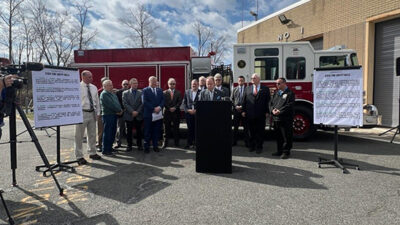Finding An Answer To Rockland’s Drug Problem
Friends,
I spent some time this week talking with Suffern lawyer Michael Zall. Though tears, Mr. Zall described the unique experience of grieving an overdose death. Along with the pain and sadness, there’s guilt and shame, stigma and isolation. Mr. Zall talked about the challenges of loving and supporting a drug user through 20 years of addiction. He talked about the long days of treatment and the high hopes of recovery that were never realized. Mr. Zall talked about his son, Jeremy, who died last year at 34.
The Zall Family is not alone in its grief. Rockland County has lost 16 residents to heroin and prescription painkillers since January. Some of these deaths have touched me personally. I’ve attended the funerals. I’ve looked into the numbed faces of my friends who just lost a child, some of whom I coached. Without question, the scourge of heroin and prescription drug abuse is tightening its already firm grip on our community every day.
In response, Rockland County is fighting back. On Monday, I was honored to stand with District Attorney Tom Zugibe in announcing a realistic community action plan to battle the region’s growing heroin and prescription drug epidemic. The plan, developed in close partnership with the United States Drug Enforcement Administration (DEA), is divided into three specific areas: targeted enforcement, treatment and prevention/education.
Targeted enforcement will coordinate information, technology and resources from federal, state and local authorities to identify and dismantle major drug supply chains and dealers. Our detectives are digging deep into social media outlets like Twitter and Instagram, where so many drug pushers are peddling their poison.
The second facet involves treatment. For heroin users, law enforcement will continue to work with the courts to seek diversion and treatment as an alternative to incarceration. The District Attorney’s Office, working with the Rockland County Department of Mental Health, the Rockland Council on Alcoholism & Other Drug Dependence Inc. (RCADD), local hospitals and other contract agencies will provide information to heroin users, in court, for immediate treatment options and resources. When a heroin addict goes to jail, they typically come out a heroin addict, unless prosecutors and families acknowledge the addiction and treat it.
Prevention and education is the final piece of our community action plan. Prosecutors and police will are being trained to identify trends in drug abuse and taught about effective treatment options. In addition, local school administrators will be encouraged to incorporate information, specifically on heroin and prescription pill abuse, into high school and middle school health class curriculum.
We can’t put our heads in the sand. The heroin epidemic is impacting all of Rockland County. It’s happening to wealthy families and poor families. It knows no boundaries. It’scritical that every level of government work together with treatment experts and schools to reverse the trend and improve health and public safety in our neighborhoods. We need to treat the users and get the sellers out of our community.
I served as a New York City police officer during the height of the Big Apple’s cocaine and crack epidemic. What we found is that we could not arrest our way out of the 80’s addiction crisis. The same holds true today with heroin and prescription drugs in our county.
Today, our police officers fill the dual role of cop and social worker. Our men and women in blue recognize addiction and partner with schools, youth groups, treatment programs and the courts to intervene. Our officers know the signs of addiction and want to help, not handcuff. In 2014, you can call the police for help and not expect to see your child arrested, but rather get the help they need.
Heroin is hard to kick because of the agonizing withdrawal symptoms that include nausea, chills, profuse sweating and paranoia. The lure of the drug is such that, even after living through withdrawal, addicts often go back to using it. Tomoms and dads: look for the warning signs. Don’t fall into denial. Don’t say “Not my kid.” If your teen or twenty-something is struggling with a pill or heroin addiction, you are not alone!
I applaud District Attorney Zugibe and his team for growing its relationship with the D.E.A. and treatment providers, like RCADD, to battle heroin and prescription drug abuse on several fronts. Working together, we will save lives.



